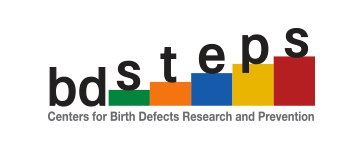About the Georgia Center for Birth Defects Research and Prevention
The Centers for Disease Control and Prevention (CDC) coordinates BD-STEPS and serves as the Georgia study site. CDC brings a lot of experience to BD-STEPS, like studying medication use among pregnant women and finding new ways to look at the data. In addition, CDC keeps track of birth defects in Atlanta through the Metropolitan Atlanta Congenital Defects Program (MACDP). MACDP has collected data in Atlanta since 1968 and serves as a model for other state surveillance systems.
More than 3,000 women from Georgia have helped us understand the causes of birth defects by taking part in the NBDPS. The Georgia Center is eager to follow up on NBDPS research findings with BD-STEPS.
Principal Investigator Dr. Elizabeth Ailes

Dr. Ailes is the Scientific Lead for the collaborative BD-STEPS Centers for Birth Defects Research and Prevention (CBDRP) and the Principal Investigator (PI) of the Georgia Center. Dr. Ailes works with a team of computer programmers, communication specialists, and other scientists that coordinate the overall study logistics and combine the data from the seven Centers. In her role as the Georgia Center PI, she focuses on the collection of high quality data from local study subjects. Dr. Ailes’ research focus is on infections and medication use and their relation to birth defects.
“I’m honored to be part of such an important study and thankful for the time and effort by the study participants and staff who make such critical work possible.”
— Dr. Elizabeth Ailes
BD-STEPS Project Officer Mary Jenkins, PhD

Dr. Jenkins is the team leader for the CDC team that is responsible for BD-STEPS, and the CDC Project Officer for the Collaborative BD-STEPS Centers for Birth Defects Research and Prevention. She manages the study staff and provides oversight to all aspects of the study, including key administrative and financial components. Dr. Jenkins’ research interests include understanding the roles that genetics and gene-environment interactions play in the causes of birth defects, as well as understanding ethical issues in genetic research and the impact of specimen collection on these studies.
"I feel fortunate to be part of a group of scientists and staff who dedicate themselves daily to understanding genetic and non-genetic causes of birth defects and stillbirths."
— Dr. Mary Jenkins
CDC Birth Defects Monitoring and Research Branch Chief Jennita Reefhuis, PhD (former BD-STEPS Principal Investigator)

Dr. Reefhuis is the Branch Chief for CDC’s Birth Defects Monitoring and Research Branch, where the CBDRP work is located. She was the principal investigator at the CDC for the collaborative BD-STEPS Centers for Birth Defects Research and Prevention from 2006-2018. Dr. Reefhuis’ research interests include the use of medications in pregnancy and their relation with birth defects, especially fertility treatments and antidepressants.
"I think every child deserves the best possible start in life, and I want to do everything I can do to help make that possible."
— Jennita Reefhuis
Notable Research Findings:
The following are selected examples of important research publications led by the GA Center.
Anderson KN, Dutton AC, Broussard CS, Farr SL, Lind JN, Visser SN, Ailes EC, Shapira SK, Reefhuis J, Tinker SC. ADHD medication use during pregnancy and risk for selected birth defects: National Birth Defects Prevention Study, 1998-2011. J Atten Disord 2018. 1087054718759753
Interrante JD, Ailes EC, Lind JN, Anderka M, Feldkamp ML, Werler MM, Taylor LG, Trinidad J, Gilboa SM, Broussard CS. Risk comparison for prenatal use of analgesics and selected birth defects, National Birth Defects Prevention Study 1997-2011. Ann Epidemiol 2017;27:645-653.e2.
Simeone RM, Tinker SC, Gilboa SM, Agopian AJ, Oster ME, Devine OJ, Honein MA. Proportion of selected congenital heart defects attributable to recognized risk factors. Ann Epidemiol 2016;26:838-845.
Dawson AL, Tinker SC, Jamieson DJ, Hobbs CA, Berry RJ, Rasmussen SA, Anderka M, Keppler-Noreuil KM, Lin AE, Reefhuis J. Twinning and major birth defects, National Birth Defects Prevention Study, 1997-2007. J Epidemiol Community Health 2016;70:1114-1121.
Ailes EC, Gilboa SM, Gill SK, Broussard CS, Crider KS, Berry RJ, Carter TC, Hobbs CA, Interrante JD, Reefhuis J. Association between antibiotic use among pregnant women with urinary tract infections in the first trimester and birth defects, National Birth Defects Prevention Study 1997 to 2011. Birth Defects Res A Clin Mol Teratol 2016;106:940-949.
Arth A, Tinker S, Moore C, Canfield M, Agopian A, Reefhuis J. Supplement use and other characteristics among pregnant women with a previous pregnancy affected by a neural tube defect-United States, 1997-2009. MMWR Morb Mortal Wkly Rep. 2015 Jan 16;64(1):6-9.
Rocheleau CM, Bertke SJ, Lawson CC, Romitti PA, Sanderson WT, Malik S, Lupo PJ, Desrosiers TA, Bell E, Druschel C, Correa A, Reefhuis J. Maternal occupational pesticide exposure and risk of congenital heart defects in the National Birth Defects Prevention Study. Birth Defects Res A Clin Mol Teratol 2015;106:823-33.
Reefhuis J, Devine O, Friedman JM, Louik C, Honein M. Specific SSRIs and birth defects: Bayesian analysis to interpret new data in the context of previous reports. BMJ 2015;351:h3190.
Contact Information:
BD-STEPS Overall and Georgia Center Principal Investigator:
Elizabeth Ailes, PhD
Centers for Disease Control and Prevention
BD-STEPS Project Officer:
Mary Jenkins, PhD
Epidemiology Team Lead of the Birth Defects Branch
Centers for Disease Control and Prevention
Phone: 770-488-3142
